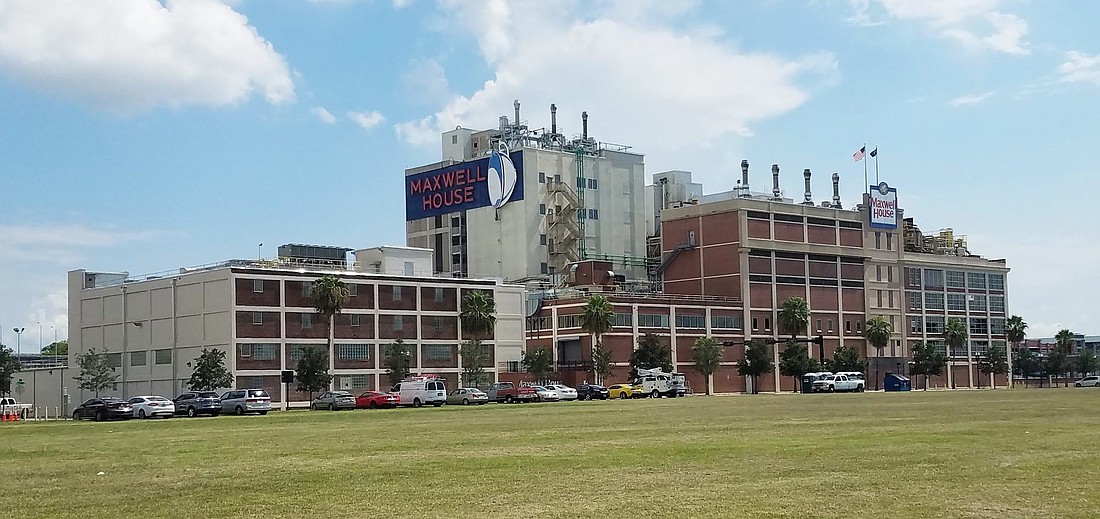
Two code-named projects that would create a total of 600 jobs in Jacksonville are seeking city incentives.
The Mayor’s Budget Review Committee voted 6-0 on April 28 to submit legislation for the projects.
Project Academy is a manufacturing company that is negotiating a deal Downtown on land that includes the Maxwell House coffee plant.
Project Skateboard is an existing IT software company that wants to expand its Jacksonville presence.
Each seeks a rebate from the city and state through the Qualified Target Industry Tax Refund Program and Academy wants an unspecified Recapture Enhanced Value grant.
The committee’s approval allows the city Office of Economic Development to introduce resolutions to City Council at its May 12 meeting to execute an economic development agreement. The office and documents do not disclose the identify of the companies.
Project Academy
A project summary calls Project Academy a multinational manufacturer that wants to establish a facility in the Southeastern U.S.
Project Academy could create up to 300 jobs by Dec. 31, 2024, according to the document filed with the April 28 MBRC agenda.
The average annual wage of those jobs is $59,146 with benefits valued at 35% of the average wage.
Academy seeks a QTI of $5,000 per job, totaling $1.5 million. The state would provide a $4,000 per job tax credit up to $1.2 million, or 80% of the rebate. The city would match that with 20%, or $1,000 a job, or $300,000.
The city estimates Academy would invest more than $40 million into buying or leasing the property, making improvements and installing manufacturing equipment, furniture, fixtures and equipment. “The negotiations have not been finalized,” the summary states.
Academy seeks a REV grant that would rebate 50% of the increase in property and tangible personal property taxes generated from the capital improvements for 10 years after it takes possession of the site and starts operations.
The city did not identify the type of manufacturing Academy performs.
Receiving incentives are “a material factor” in deciding on a location, the summary said.
Project Academy would be approved in two separate pieces of legislation – one requesting approval for the city to participate in the QTI program, which the summary said sunsets June 30, and a second submitted by the Downtown Investment Authority for approval of a REV Grant once the location is determined.
The company is evaluating port cities in Alabama, Florida, Georgia, South Carolina and Virginia, according to the summary.
The summary encouraged urgency to take advantage of the QTI program. Because of the quick turnaround, Project Academy hasn’t finalized a location in Jacksonville, but seeks to purchase or lease a site within Census tract 174.
That tract is bounded by the western end of the Hart Expressway and along Palmetto Street, north to Eighth Street in Talleyrand and the St. Johns River to the south and east.
The Maxwell House coffee plant, owned by Kraft Heinz Foods Co., is on part of tract 174, but the tract also includes properties along Talleyrand Avenue up Eighth Street.
Kraft Heinz asked the DIA in December to redraft the terms of its 2016 incentives agreement with the city after failing to hit a job target at its Downtown Maxwell House plant. The DIA withdrew the resolution a few days later.
CNBC reported in February 2019 that Kraft Heinz was considering a sale of the coffee brand, but the company has not commented on the possibility.
Kraft Heinz reported a 6% increase in first quarter sales, and an 18.7% increase in coffee sales. It had been projecting a decline in sales.
The company’s plant in Downtown Jacksonville at 735 E. Bay St., which employs about 200 people, is the last remaining Maxwell House plant in the U.S. It has been operating at that location since 1924.
Project Skateboard
Project Skateboard is described as an IT company that designs software for health care, transportation and financial institutions and has a presence in Jacksonville.
It is considering expanding its workforce in Jacksonville by 300 jobs at an average wage of $74,300 by Dec. 31, 2024.
The summary estimates the project would create an estimated $1.4 million capital investment comprising real estate improvements, IT equipment, furniture and fixtures.
It seeks a QTI rebate of $1.8 million, or $6,000 per job, after the jobs are created and the taxes paid.
The state would rebate $4,800 per job, up to $1.44 million total, to be repaid over a six-year payout starting in 2021.
The city would refund up to $360,000, or $1,200 per job.
Skateboard said the financial incentives are a material factor in their decision to expand in Jacksonville.
Editor Karen Brune Mathis contributed to this report.